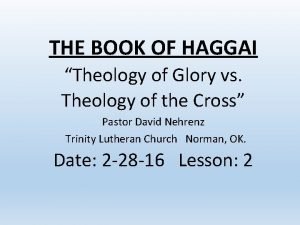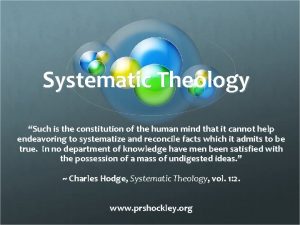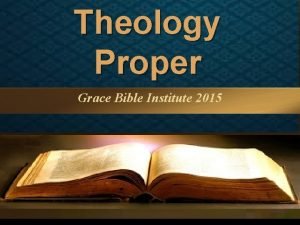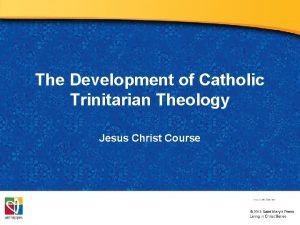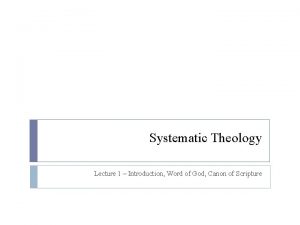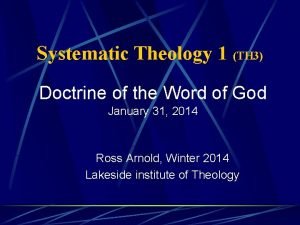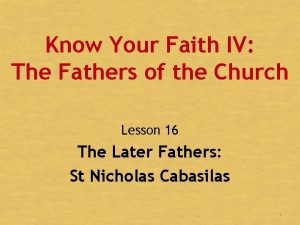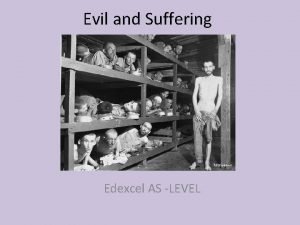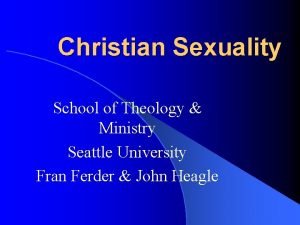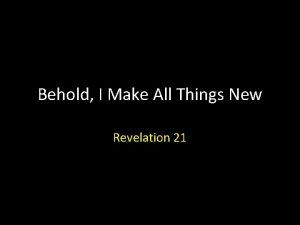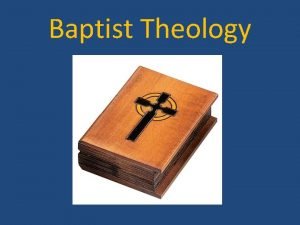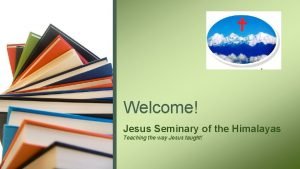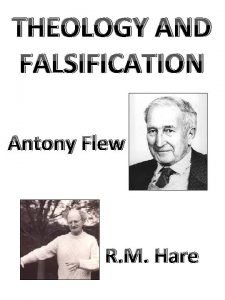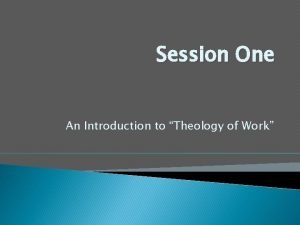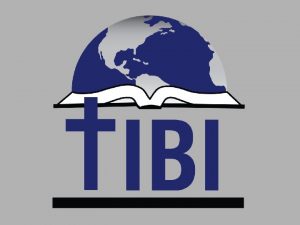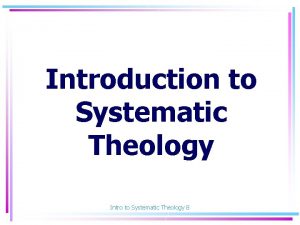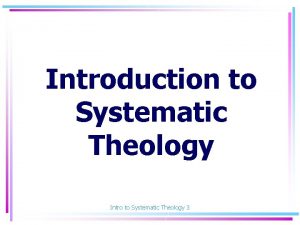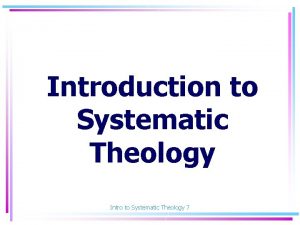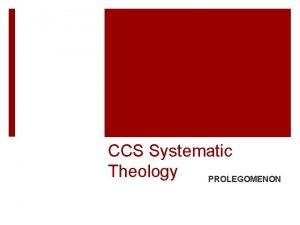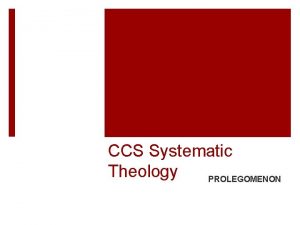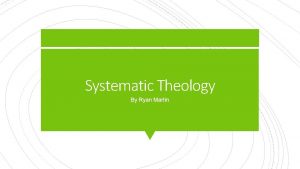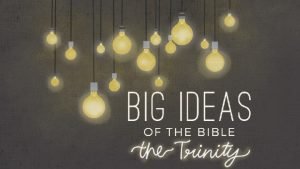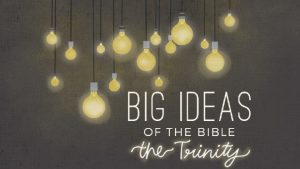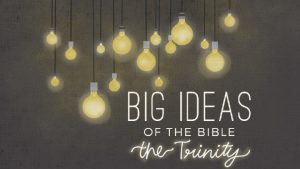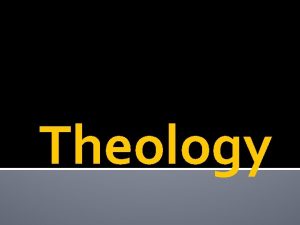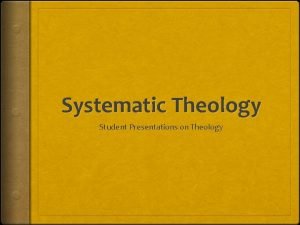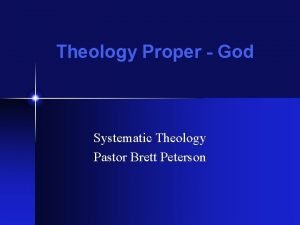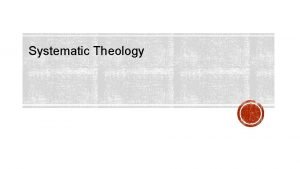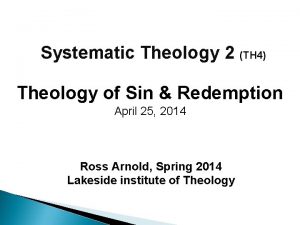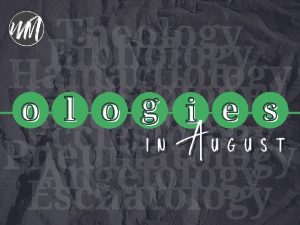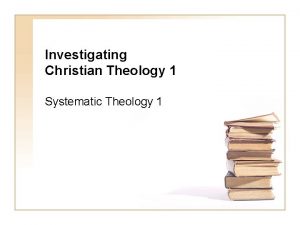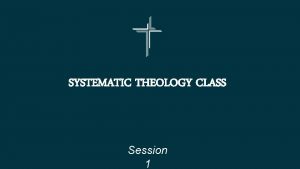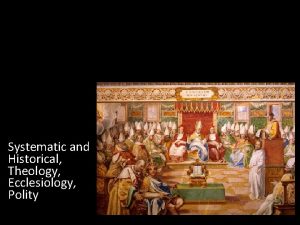Introduction to Systematic Theology Intro to Systematic Theology




















- Slides: 20

Introduction to Systematic Theology Intro to Systematic Theology 2

SOURCES OF REVELATION: • Roman Catholic Theology – There is One Source (tradition) in two kinds • • Tradition One Tradition Two Mediated by the teaching office of the Church. See The Documents of Vatican Two, the dogmatic constitution on Divine Revelation (Dei Verbum) 9, 10 which speaks of a “single sacred deposit. ” – Scripture is “tradition one” – Oral Tradition is “tradition two” – The Magisterium Ecclesiae is the teaching office of the Church 1/11/2022 Intro to Systematic Theology 2 2

SOURCES OF REVELATION: • The Subjective View – Some say the source of revelation is not to be found in any objective source – Essentially, Christian Experience is the source of revelation • This is the preponderant view of classical Protestant Liberalism (Consciousness theologians) – Schleiermacher – Ritschl – Also, some forms of Pentecostalism 1/11/2022 Intro to Systematic Theology 2 3

SOURCES OF REVELATION: • The Multiple Source View – The “Wesleyan Quadrilateral” • Scripture (Supreme Authority) • Reason • Tradition • Experience – Scripture, Reason, and Tradition are the traditional sources in the Anglican Formula 1/11/2022 Intro to Systematic Theology 2 4

SOURCES OF REVELATION: • The Multiple Source View – B. B. Warfield • Nature (What God has created: would include Reason) • Providence (What God has done in history, in the Church) Tradition? ? ? • Experience (What God has done in your life) • Scripture (What God has said) – “The revelation of God in his written Word is easily shown not only to be incomparably superior to all other manifestations of him in the fullness, richness and clearness of its communications, but also to contain the sole discovery of much that is most important for the soul to know as to its state and destiny. ” Warfield, Studies in Theology, 60 -1. 1/11/2022 Intro to Systematic Theology 2 5

SOURCES OF REVELATION: • God reveals himself through many means, all of which contribute to our knowledge of God- but Scripture is Fons Unicum – However, we must distinguish between • Scripture, as the unique source of revelation, and • Other sources as subordinate to Scripture • The Latin terms normans and normativa provide help – Scripture is normans, a rule that rules – All other revelatory media (Experience, Tradition, Providence, Reason) are normativa, a rule that is governed- by Scripture, in this instance 1/11/2022 Intro to Systematic Theology 2 6

THE ACTION OF THEOLOGY: • The Meaning of Systematic – Does not imply other disciplines are not systematic • Rather, it refers to the logical coherence that exists among divine truths – The “Action” of Systematic Theology • Is not bringing order out of chaos • Is not imposing an external system on Scripture 1/11/2022 Intro to Systematic Theology 2 7

THE ACTION OF THEOLOGY: • Doing Systematic Theology does not imply an infinite number of strands we can weave into any theological tapestry of our own design • The “Action, ” instead, is recognizing the fabric of revealed truth that already exists in sacred Scripture • Doing Theology does not produce new truth. Rather, it reproduces the truth • Doing theology, however, may bring to light new truth as at the time of the Protestant Reformation 1/11/2022 Intro to Systematic Theology 2 8

THE ACTION OF THEOLOGY: • Theological Presuppositions – There is Unity in the Scriptures by virtue of their ultimate author, God himself – There is an Integrity to the Scriptures; it represents the truth its author intended us to know – There is a Coherence to the Scriptures • It holds together presenting a seamless fabric of redemptive truth • From the first promise of the Savior to the final consummation- the Bible hangs together • There is not a diffusion of themes or ideas, as in a college course anthology 1/11/2022 Intro to Systematic Theology 2 9

THE WARRANT FOR THEOLOGY: • New Testament Fulfillment Language – For example, Matt. 1: 22, “All this took place to fulfill what the Lord had said through the prophet. ” • The Analogy of Scripture – Often, the illumination of one part of Scripture is based upon another • For example, it is not possible fully to understand I Corinthians 6 apart from Genesis 2 – The understanding of one part is often based on other parts • For example, it is impossible to understand Romans 8: 30 fully without knowing what the Scripture teaches elsewhere about predestination, calling, justification, and glorification 1/11/2022 Intro to Systematic Theology 2 10

THEOLOGY AND CULTURE: • There is a chronological development of theology- this is the lesson of historical theology • There are cultural influences on the development of theology – This, too, is demonstrated by the unfolding of Church History – Cultural influences include, for example, Hebraic, Greek, Roman, North African, and Western European 1/11/2022 Intro to Systematic Theology 2 11

THEOLOGY AND CULTURE: • The Evangelical Presupposition – Since the Scriptures, ultimately, are God’s revelation to all of mankind, there will be a unity of truth even in the midst of diverse cultural emphases and contextualized language – Some evangelicals “have tended to view theology as transcultural or culturally neutral. Always fearful of the historicist notion of theology, these evangelicals have typically championed biblical authority by claiming that there is only one horizon in theologythe biblical text itself. ” Richard Lints, The Fabric of Theology, 102 1/11/2022 Intro to Systematic Theology 2 12

THEOLOGY AND CULTURE: • There are two horizons that must be addressed if one is to do theology properly – The Ancient World: the biblical text and its cultural milieu – The Modern World: the interpreter and the culture in which the interpretation occurs and is applied – Indeed, “. . . there is still the need to link those understandings [the ‘specific cultural and historical meaning of Scripture’] up with the target culture into which we wish to announce these words, not to mention our need to be aware of our own cultural baggage as interpreters. ” Walter Kaiser and Moses Silva, An Introduction to Biblical Hermeneutics, 175 1/11/2022 Intro to Systematic Theology 2 13

THEOLOGY AND CULTURE: • Some interpreters (usually of the more critical schools) have erred on the other extreme – They suggest “that the meaning of the biblical message is actually determined by the constraints of the contemporary culture, that the Scriptures have no other meaning than that which is permitted by the conceptuality of the present-day situation. ” Lints, Fabric, 102 – Lints gives, as an example, the methodology of Rudolf Bultmann – The key idea that must be considered is the unavoidable fact that “we hear the divine conversation only after it has passed through several filters. ” Lints, Fabric, 60 1/11/2022 Intro to Systematic Theology 2 14

THEOLOGY AND CULTURE: • There a number of INTERPRETIVE FILTERS (or, MATRICES) that every interpreter employs – – – – – 1/11/2022 Personal/Family Characteristics Individual Religious Tradition National, regional culture Racial heritage Social Relationships Educational Matrix Personal Faith Experience Vocational/Leisure-time Matrix Cross-cultural experience Intro to Systematic Theology 2 15

THEOLOGY AND CULTURE: • There is a transcultural aspect to the doing of theology: “Ought we to give our western creeds to the Oriental mind? . . . Of course those Western creeds ought to be given to the Oriental mind. But that ought to be done only on one condition- that those western creeds are true. If they are not true, they ought not to be given to the Oriental mind or to any other kind of mind; but if they are true, they are just as true in China as they are in the United States. ” Machen, Christian Faith in the Modern World, 93 1/11/2022 Intro to Systematic Theology 2 16

THEOLOGY AND CULTURE: • “Our final and fundamental hope rests in the conviction that God himself communicates across cultures, principally across that cultural chasm that lies between himself and us. As Gabriel Fackre has suggested, ‘We are not so locked into our ecclesial or cultural positions that its truth cannot make itself known to us- the Word addresses the hearer- even to the extent that a contemporary perspective from which a text is viewed can be challenged, modified and even overturned by the text. ’” Lints, Fabric, 114 1/11/2022 Intro to Systematic Theology 2 17

THEOLOGY AND CULTURE: • There is an unavoidable cultural influence in the doing of theology and consequentially, a need to evaluate critically its effect on theological task: “Contemporary theologians must also seek to challenge the contemporary mind to think more critically about its own culturally accepted values. ” Lints, Fabric, 113 1/11/2022 Intro to Systematic Theology 2 18

THEOLOGY AND CULTURE: • “I wonder if we really recognize that all theology represents a contextualization, even our own theology? We speak of Latin American theology, black theology, or feminist theology; but without the slightest second thought we will assume that our own theology is simply theology, undoubtedly in its purest form. Do we recognize that the versions of evangelical theology held by most people in this room are in fact North American, white, and male and that they reflect and/ or address those values and concerns? ” Stanley Gundry, “Evangelical Theology: Where Should We Be Going? ” Journal of the Evangelical Theological Society 22 (1979): 11 1/11/2022 Intro to Systematic Theology 2 19

Introduction to Systematic Theology Intro to Systematic Theology 2
 Book of haggai
Book of haggai Biblical theology
Biblical theology Define theology proper
Define theology proper What is theology proper
What is theology proper Basil mitchell
Basil mitchell The development of catholic trinitarian theology
The development of catholic trinitarian theology Theology proper lecture notes
Theology proper lecture notes What is theology
What is theology Palamite theology
Palamite theology Irenaean theodicy strengths and weaknesses
Irenaean theodicy strengths and weaknesses Seattle university school of theology and ministry
Seattle university school of theology and ministry Behold i make everything new
Behold i make everything new Baptist theology
Baptist theology Arminian theology
Arminian theology Mike mazzalongo church
Mike mazzalongo church 5 pillars of reformed theology
5 pillars of reformed theology Jesus seminary
Jesus seminary Antony flew falsification
Antony flew falsification Symbols in the crucible
Symbols in the crucible Theology of work
Theology of work Practical theology mpt
Practical theology mpt
